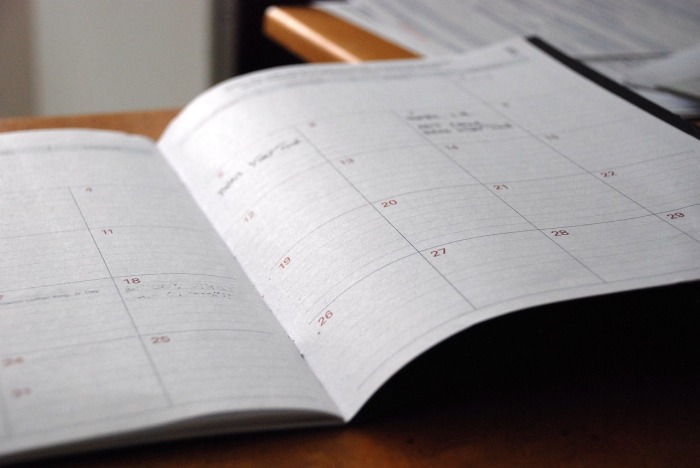So you’ve made it. You moved in, said goodbye to your parents, joined an incredible Greek organization, and now you’ve survived your first few weeks of classes. While these first few weeks of school were new and exciting, reality will set in. You’re going to have homework, exams, chapter meetings, philanthropy events, social events, and not to mention meetings for other student organizations you want to be involved in. The number one fear we always hear from new freshman is that they are not sure if they can balance the obligations of Greek Life and their academics. What you don’t always realize, is that the number one priority of Greek Organizations is academics. We are all here to be college students first and members of our organizations second. These organizations exist to not only provide a sense of belonging here on campus, but to help you thrive in all aspects of your life. While managing all your obligations is difficult, here is some advice to help you learn important time management skills:

1) Buy a planner! You can literally get one anywhere such as Target and Staples. I recommend finding one that has monthly calendars at the beginning and then breaks down into weekly agendas. In the monthly calendars, I like to write down major events like exams, important assignments, class projects, social functions, athletic games, philanthropy events, etc. This way I can see when all of my main events are happening in relation to one another. It is so important to know when you might have exams and important Greek events during the same week so you can plan your study time in advance. I then use the weekly agenda to write down all of my homework, such as notes or worksheets, and all of my minor weekly meetings. This allows me to understand what all I need to get done each day while also keeping in mind what I need done by the end of each week. Understanding what you need to get done and the time frame you have to do it, is essential to being successful. While it’s important to write all of this down, it is even more important that you actually use your planner every single day. Do not let it become just another notebook that takes up space in your backpack!

2) Decide what is mandatory and what is optional. To quote my mom, “you have to do your have to dos, before you do your want to dos.” Look at all of your obligations each month and determine which are absolutely mandatory and what are things that you simply just want to do for fun. For example, weekly chapter meeting is mandatory, class is mandatory, your chapter’s philanthropy event is mandatory. Those are all of your “have to dos.” Going to a social event, grabbing lunch with a friend, or going to an athletic game are all of your “want to dos.” Realize that sometimes you are not going to be able to do it all. If there’s a social on a Thursday, but you have an exam on Friday morning, then you are going to have to miss out on the social. Saying no to the “want to dos” that conflict with those “have to dos” is totally ok. For every event you miss, there will always be another one.
3) Ask for help. One of the best parts of being in a Greek organization is that you are bound to have class with members of your chapter. Make study groups with them! It is a great way to meet and get to know other members in your chapter while still studying for your classes. Plus, you’ll never have to pull an all-nighter alone! Another great benefit with being in such a large organization is that there are older members who have been there and done that before you. There is bound to be at least one member (if not more) who has the same major or has taken the same classes as you. Use them! They are always willing to show you which classes and professors to take or how to take notes and study for the class.
4) Most importantly, use your chapter’s Academics Chair. This is usually a member who has high academic achievement and wants to help guide others to reach their own academic achievement. Their entire position is to help you be a better student! If you are struggling in a class, they will help you seek help whether that’s from someone in the chapter or from an on-campus tutoring place. If you are nervous to get help on campus, they will probably go with you! You are surrounded by opportunity to be academically successful, take advantage of it!
Your chapter wants you to be successful in all areas of your life, but especially in your academics. Chapters love to brag and boast about all of the incredible achievements in your life. Whether that’s getting an A on the exam you thought you failed or getting into the program you dreamed of, they love seeing you accomplish your goals and will help with anything in order to get you there. Yes, it will be hard, but college is hard for everyone. It isn’t supposed to be easy. Luckily in your chapter, you will be surrounded by people who will be there to help you through the hard times in order to make them easier and to celebrate with you during the good times to acknowledge how hard you worked.
Please note that the comments of Dr. Golding and the others who post on this blog express their own opinion and not that of the University of Kentucky.
 Flashcards have a interesting reputation. On the one hand they are typically viewed as a tool for young children who are learning basic arithmetic. A child reads 2 + 2 on the front of a card and then must come up with the answer. They check their accuracy by looking on the back of the card. On the other hand, my own research has shown that flashcards really have no age limits and that flashcards are especially useful for college students. If you need to study a large amount of information and you are going to be asked specific questions (e.g., multiple-choice exams) flashcards are an ideal way to study. As I said in my earlier post, whether it is learning chemical symbols, psychological terms, or historical events flashcards work!
Flashcards have a interesting reputation. On the one hand they are typically viewed as a tool for young children who are learning basic arithmetic. A child reads 2 + 2 on the front of a card and then must come up with the answer. They check their accuracy by looking on the back of the card. On the other hand, my own research has shown that flashcards really have no age limits and that flashcards are especially useful for college students. If you need to study a large amount of information and you are going to be asked specific questions (e.g., multiple-choice exams) flashcards are an ideal way to study. As I said in my earlier post, whether it is learning chemical symbols, psychological terms, or historical events flashcards work!
 Before I get to the specifics of how to do this, I must step back and say that there are always going to be some students who will read about setting up a study schedule and will shrug it off. Some will argue that they never had to be very organized with their studying in the past and have still done well. To these students I say “Lucky you”–you are either that smart or your classes so easy that you were not challenged on your exams. However, it is typically the case that these students will run into a class or classes where the lack of a study schedule will lead to a very low grade. I know this, because every year when I teach Introduction to Psychology—not the hardest class but a class that definitely has a lot of content—I get students who did poorly on exams because they had no plan for studying.
Before I get to the specifics of how to do this, I must step back and say that there are always going to be some students who will read about setting up a study schedule and will shrug it off. Some will argue that they never had to be very organized with their studying in the past and have still done well. To these students I say “Lucky you”–you are either that smart or your classes so easy that you were not challenged on your exams. However, it is typically the case that these students will run into a class or classes where the lack of a study schedule will lead to a very low grade. I know this, because every year when I teach Introduction to Psychology—not the hardest class but a class that definitely has a lot of content—I get students who did poorly on exams because they had no plan for studying.